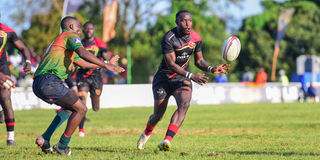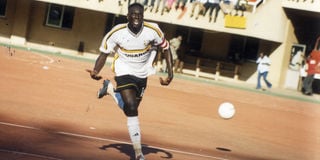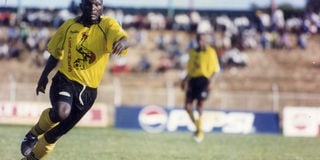Prime
Magomu, Lekuru, Obua and sports authorities muzzling athletes over dissent

Magomu has lit a fire. PHOTO/JOHN BATANUDDE
What you need to know:
The past weeks have been filled with yet another episode of drama in rugby circles. The national 15s team captain, fly half Ivan Magomu, has been banned by Uganda Rugby Union (URU) from all rugby activities for 24 weeks.
His crime? "Bringing the sport into disrepute", reads the core part of the charge sheet. Magomu was accused of attacking a match official in May but that fell out of the stipulated citation period and Disciplinary Committee chairperson Jeroline Akubu acquitted him on that charge.
His second, "crime", which actually borders on gagging, concerns his use of social media.
Magomu is accused of reposting and commenting on a post on X, formerly Twitter, where the permanent secretary in the Ministry of Finance, Planning and Economic Development, Ramadhan Ggoobi, on July 25 wrote to Ambrose Tashobya, the Chairman of National Council of Sports (NCS), informing him that Bernard Patrick Ogwel, the NCS General Secretary, was not fit to be the body's accounting officer.
According to the letter, the Auditor General and Internal Auditor General had faulted NCS on accountability grounds and the buck stopped at Ogwel's doorstep.
Magomu has regularly raised queries on player welfare and how funds allocated to different sports governing bodies from government, sponsors and partnerships don't necessarily trickle down to the athletes.
URU came guns blazing and in their book, Magomu had used improper channels and thus brought the sport into disrepute.
Magomu attended a hearing on August 8 and eight days after, the Union announced its take on the proceedings where it announced a 24-week ban from all rugby activities for club and country, plus stripping Magomu of his national team captaincy.
Magomu and his legal advisors have lodged an appeal.
It is very clear that sports governing bodies try hard to put a gun on the mouths of athletes who question their policies, especially when it comes to money. And in a setting like ours, where accountability is as rare as the truth in its general frame, players bear the brunt of their bosses' gagging.
The bosses will watch from a safe distance, waiting for the right time to pounce, and go for the jugular. Like a lion on a hunt, they don't mind squeezing the remaining breath out of their prey as long as it keeps their ego and pockets oiled.
In Uganda, players who have stood up to that slavery have been decisively dealt with. Some have seen their careers end prematurely as a result of this sledgehammer on their heads. As Magomu fights back with all his remaining breath, let us revisit those that have walked the path before him. After all, history shapes the future through learning and failing.
David Obua
The man. The myth. The legend. They don't make them anymore. Obua was that marquee player in the Uganda Cranes team and came with a big ego and big stage performances. Proud and arrogant, they used to say. He divided opinion among fans, teammates and coaches. Temperamental and a no-nonsense lad. A non conformist. Beauty and beast all rolled into one.
Obua's performances for Uganda made him a cult hero in the eyes of many. That golden goal away in Mauritius. The goal against South Africa in Soweto; one that sold him to Kaizer Chiefs. The hat trick against Niger at Namboole. The penalty that sent Nigerian goalkeeper Vincent Enyeama to the shop to buy candy. The lone strike away in Guinea-Bissau that gave Uganda its first away in an Afcon qualifier in more than a decade.
Despite all this, Obua was a marked man. In the 2012 Afcon qualifying campaign, Obua and Uganda faced Guinea-Bissau at Namboole. Obua had an off colour game by his standards. Yes, he had created one goal but that wasn't enough for him. He demanded more from himself and as he was still trying to better himself, the substitutes board went up.

David Obua ended up on the wrong side of administrators. PHOTO/EDDIE CHICCO
Geoffrey Sserunkuma was to replace him. Like a Black Mamba, he seethed with rage. He bit his lips. He got his shirt off and threw it on the Namboole turf. Walked off into the dressing rooms.
Lawrence Mulindwa, the then Fufa President, in a press conference at Hotel Sojovalo, literally cursed Obua and assured the nation that he will never play for Uganda again.
Obua apologized to his teammates and the nation at large. Ugandans knew they needed him. They took it in, as the country still had a chance to qualify.
The last nail in Obua's coffin came in the buildup to the all important, penultimate game of the campaign against Kenya.
Uganda's chances largely hinged on a win over Kenya. Big stage dog Obua again carried the hopes of the nation on his shoulders. Uganda must beat Kenya, everyone prayed.
Politicians seized the opportunity. The team's training sessions became political campaign platforms in many ways. Every politician wanted to visit Namboole and wish the team well, "in person".
On the eve of the match, the camp received communication that President Museveni wanted to visit them. That's when Obua stood up to be counted.
You see, he was the second most senior player, a former captain, and the top performer. And naturally, one tough guy. The team was told that Museveni would just come, talk to them (as usual, he likes lecturing) and wish them well.
"He needs to listen to us, too. We have a few questions for him," Obua is quoted to have told the authorities.
They refused, insisting that no player would be allowed to ask any questions. They knew what Obua was capable of. They knew he was going to ask or tell Museveni about their welfare and working conditions.
Obua lost it. If a player can't ask the President a few questions and pick the big man's mind on a few things, then what's the importance of him visiting camp?
Football is a team sport but trust me, Lautaro Martinez is not Lionel Messi. George Orwell's Animal Farm? Yes.
This disagreement saw Uganda's source of important goals leave camp. Uganda went on to draw goalless with Kenya and lose out on qualification.
Recently, Mulindwa told NTV Sport Knights that the decision to kick Obua out of the team was solely coach Bobby Williamson's. Surely? Any coach would want their most important player in their most important game. We all know how it played out. That day was Obua's last in Cranes.
Magid Musisi
Magid Musisi needs no introduction to Ugandan sports enthusiasts. One of the most potent strikers in SC Villa and Uganda Cranes history, Musisi was also the first Ugandan footballer to play in one of Europe's Top 5 leagues, following his transfer from Villa to France's Rennes.
His transfer from Rennes to Turkiye's Bursaspor reportedly grossed a million dollars in 1997.
He took over the national team captain reins from Paul Hasule and punished opponents with all types of goals.
But prime Musisi was a headache to authorities. Teammates tell of stories of Musisi disorganizing camp with dollars, booze and forming bands of friends and enemies within the national team.
But as his health powers waned, so did his financial muscle. He became a thorn in the flesh of football authorities, asking for improved welfare of his teammates but also, for himself because he was no longer "rich".
In 2000, Uganda was preparing for an Afcon qualifier against Guinea and had pitched camp in Jinja. Musisi led his teammates in demanding allowances for players' families, commonly known as kameeza.
Dennis Obua, the Fufa head, is reported to have plotted a move to boot Musisi out to send a message that no one was untouchable.
He instructed head coach Harrison Okagbue to kick Musisi out of camp. The Nigerian followed his boss' instructions and that became the end of Musisi. It is said that he had stepped out of camp with a few other players.
Ironically, in the 1970s when Obua was still a Cranes player, coach David Otti and Manager Jaberi Bidandi Ssali found him out of camp alongside Phillip Omondi but they secretly reprimanded the duo in a way that wasn't antagonistic to the team's preparation.
Adrian Bukenya
Back to rugby. Adrian Bukenya is the most successful captain in national 15s team history. Leading Uganda to the covered CAR trophy in 2007, at the expense of powerhouses like Namibia and Kenya should earn him a meal anywhere in this land.
But alas...we are in Uganda. Bukenya led by example, on and off the field. He demanded the best from his troops but also did the same from the bosses when it came to coughing up. And in Uganda, that rubs them the itchy way.
Bukenya was unceremoniously dropped and the reasons given were as flimsy and they come: they wanted to build the team around "young" players, under a younger, hungrier captain. But as truth outshines lies, the minders of the sport shot themselves in the foot by choosing John Musoke, who, ironically, was older than Bukenya. Perhaps they took the decision without revisiting the two players' passports and birth certificates. How clumsy!
Emilly Lekuru
Now, this is recent. In October last year, Lekuru was called up to the women's 7s team preparing for Dubai. She turned down the call-up, because she was very busy at her workplace. We all know how work schedules can collide with sports activities and it takes one hell of effort to balance the two.
Lekuru asked URU to write to Rugby Tackling Life (RTL), her employers, to see if they could reach a middle ground. They didn't.
In short, URU expected the player to just walk away from her work commitments and go play. In January, Lekuru posted on X, explaining her case to the world. URU pounced, with their "bringing the sport into disrepute" charges and slapped Lekuru with a ban that saw her miss out on league and Uganda Cup games.
Like Magomu, Lekuru was fronting her case on welfare. Welfare is not only allowances from URU and its partners. By sticking to demands of her job, she was securing her welfare.
Unfortunately for her, she received minimal support from the rugby fraternity, including Black Pirates, her father's club. Again, George Orwell's Animal Farm.

Magid Musisi often went outside of the line.
Phillip Obwiny
In 2004, Obwiny was the most senior player in the Uganda Cranes team, having made his debut a decade prior. Obwiny's consistency and versatility saw him anywhere on the pitch bar goalkeeping. He wore the Captain's armband wherever he played (Express, SC Villa, URA, Nalubale FC) and Uganda Cranes.
He is also arguably the most decorated footballer, locally. His troubles with the authorities came when he had just passed over the captaincy to David Obua in 2003.
I take Obwiny as my "godfather" in football because I lived in his house, he gave me football boots and other things to help me further my career. I didn't go past the Fufa Big League for many reasons.
In being close to him, I witnessed his work ethic from close range. I also know that he is a guy that can watch TV for the most part of the night but still be awake before dawn and go about his business without any problem. He used to tell me that different people were created differently.
Now, in "excessively" watching TV, the authorities saw a gap to throw him out of the team.
But it was all a made-up move because he had actually been pinpointed as the leader of the players demanding for better allowances from Fufa. So one night, he, alongside Joseph Mutyaba, were watching TV in Ibra Sekagya's room.
Mohammad Abbas, the Egyptian coach manning Cranes, told the two to pack their bags and leave camp.
So, why was Sekagya, their host, not expelled with them? Your guess is as good as mine.




